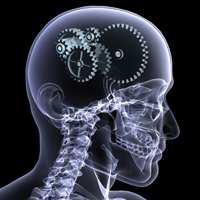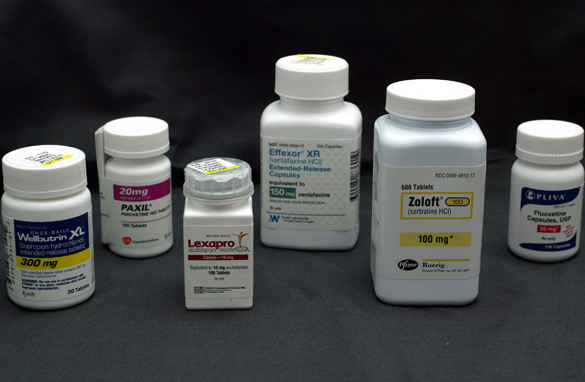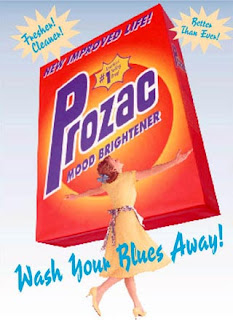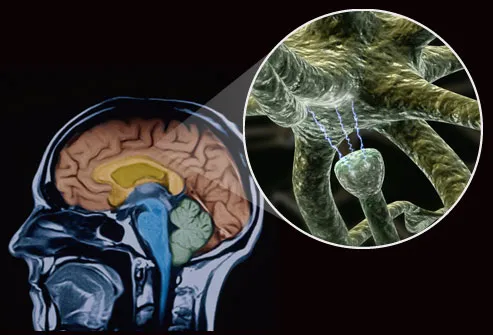I’ve written a lot about my use of Prozac as just one of many tools to treat my OCD. [See The Bad Pill Kept Me From The Good Pill]
Mood music:
As a result I’ve gotten a fair amount of questions about the true value of anti-depressants. I’m not a doctor, so don’t take my perspective as Gospel. Also remember there’s no one-size-fits-all solution here. What I write here is based on my own personal experiences. What works for me may not work for the next person.

The more I read up on depression, mental illness and the drugs prescribed for it, the more I see the human brain as an engine. Comparing it to an engine makes this whole think easier to understand.
We know that the engine of a car is made up of many small parts and when one part gets worn out the rest of the engine can fail. We know that a car needs just the right amount of oil, transmission fluid, brake fluid etc. to function properly. If the oil runs out, the engine seizes up. If the brake fluid runs dry, the breaks fail. On the flip side, too much of these fluids can harm the engine.
We also know that the auto mechanic uses many different techniques to keep engines healthy or fix them when they break.
The brain works much the same way.
![[ImgPet.jpg]](https://theocddiaries.com/wp-content/uploads/2012/04/imgpet.jpg?w=300)
Think of the different drugs as different tools to deal with very specific problems in the engine.

In my case, Prozac addresses the very specific fluid deficiencies that spark OCD behavior. The effect is not as simple as the image below suggests (though I do like the image and need to find the artist so I can properly credit him/her):

It may also be useful to think of the therapist as the auto mechanic who is well versed in how to regulate the different engine fluids and pinpoint specific fixes for specific problems. It’s also true that there are good mechanics and bad mechanics who sometimes make the problem worse. [More on this in my previous post: Have Fun With Your Therapist (A.K.A.: The Shrink Stigma)]
In the brain, when certain fluids are running low, the engine stops working properly. The result is depression and a host of other mental disorders.
Since OCD is essentially the brain pumping and spinning out of control, I like to think of my specific problem as a lack of brake fluid.
But the good folks at WebMD explain it much better than I ever could. Here’s some WebMD wisdom I included in a previous post, Prozac Winter:
How Antidepressants Work
Most antidepressants work by changing the balance of brain chemicals called neurotransmitters. In people with depression, these chemicals are not used properly by the brain. Antidepressants make the chemicals more available to brain cells like the one shown on the right side of this slide:

Antidepressants can be prescribed by primary care physicians, but people with severe symptoms are usually referred to a psychiatrist.
Realistic Expectations
In general, antidepressants are highly effective, especially when used along with psychotherapy. (The combination has proven to be the most effective treatment for depression.) Most people on antidepressants report eventual improvements in symptoms such as sadness, loss of interest, and hopelessness.
But these drugs do not work right away. It may take one to three weeks before you start to feel better and even longer before you feel the full benefit.
And, just as weather can impair the performance of your car engine (my father‘s car went for a swim when Revere got flooded out in The Blizzard of 1978 and never worked properly again), too much bad weather can keep the brain from working properly:
Why do I seem to get so gloomy each winter, or sometimes beginning in the fall?
You may have what’s called seasonal affective disorder, or SAD. The condition is marked by the onset of depression during the late fall and early winter months, when less natural sunlight is available. It’s thought to occur when daily body rhythms become out-of-sync because of the reduced sunlight.
Some people have depression year round that gets worse in the winter; others have SAD alone, struggling with low moods only in the cooler, darker months. (In a much smaller group of people, the depression occurs in the summer months.)
SAD affects up to 3% of the U.S. population, or about 9 million people, some experts say, and countless others have milder forms of the winter doldrums.
So this worsening of mood in the fall and winter is not just my imagination?
Not at all. This “winter depression” was first identified by a team of researchers at the National Institute of Mental Health in 1984. They found this tendency to have seasonal mood and behavior changes occurs in different degrees, sometimes with mild changes and other times severe mood shifts.
Symptoms can include:
- Sleeping too much
- Experiencing fatigue in the daytime
- Gaining weight
- Having decreased interest in social activities and sex
SAD is more common for residents in northern latitudes. It’s less likely in Florida, for instance, than in New Hampshire. Women are more likely than men to suffer, perhaps because of hormonal factors. In women, SAD becomes less common after menopause.
I’m still learning the science of mental illness, and remember I’m not a doctor. I just share my personal experiences and explain what works for me.
Class dismissed.

Really well done post Bill. Well thought out, organized, and well written. I liked the metaphor of the engine, the brain, and the mechanic.
The pharmacological world is fraught with mysticism and sorcery….in my humble opinion. My first hand experiences bear this out after recounting how the Doctor prefaced their recommendations, “We’re going to try this first and see how it works…” which is akin to the shop mechanic troubleshooting a non-functioning stamping machine by banging it with a large hammer to unfreeze the part…”I’m going to try this first!”
Western medicine is a push drugs first, operate second type of business. I think back to when I was a kid and how I played out my sense of curiosity and wonderment. First, I’d use a magnifying glass to inspect something up close. Then I’d use the same glass to focus a beam of sunlight on the object. Sadistic child, I know. Then I’d dissect it. I didn’t realize it then, but I’d established what has become today standard medical practice. Imposing my will was the surest way to bring about a desired result. Sadly, all of my insect, amphibian and fish patients didn’t make it. But I learned a lot; mostly that I wouldn’t be a very good doctor.
Those damned annuity drugs. Annuity drugs is the term the pharmaceutical industry has coined for meds that sustain quality of life. If you have diabetes you must take insulin to process sugar. High blood pressure, you gotta take your meds so you don’t have a stroke or heart attack. Same with mental illness. As someone who is an annuity drug user I often wonder what happens to those people who can’t afford them or that choose other alternatives. Diet can have a big impact. Eastern medicine has be working wonders for thousands of years with acupuncture, herbs, meditation and massage. I suppose it’s more difficult to afford a condo in Aspen, Porsche Turbo, Silicone implants for the mistress and whatnot if you’re just pushing a few pulverized dry leafy plants across the counter, but we can’t forget that ultimately the customer must decide how they want to be treated. Because we’ve been so strongly conditioned that doctors know best, very few people know how to advocate for themselves when hit with a barrage of treatment plans. There are options.
Drugs for treating mental disorders, or any affliction for that matter, is more art than science. Physicians and psychiatrists don’t know how a certain drug interacts with a person’s physiology or brain chemistry. It’s largely trial and error until the patient indicates or perceives that they’re feeling better. Beyond these tangibles, whatever medical benefits are claimed the side-effects can actually be more harmful. This cannot be overlooked. The cruel irony is that the FDA actually approves every drug for sale on the market. This approval is granted on the basis that the “drug does what the manufacturer says it does.” Truth in advertising up to the point that they even must include the side-effects which can include organ failure, internal bleeding or sudden death. At least we were warned I guess.
Ambien, a sleeping pill, has horrible and violent side effects. I’ve seen them firsthand in a family member. Oxycontin, a pain med, has horrible and violent side effects. My youngest son’s two friends, one 18 and one 22, both died from this poison last year. I personally know 6 people who are/were addicted to it. Vioxx killed people and was taken off the market. All these drugs ran the FDA gauntlet (which approved of the drug’s efficacy and safety) and were prescribed by doctors and sold to consumers.
None of this is meant to negate any beneficial results obtained from pharmaceuticals. There are other options however than BIG PHARMA, that’s all. St. John’s Wart for depression. Sunlight stimulates vitamin D production and helps beat Winter depression. Milk Thistle for lowering cholesterol. Beet juice helps lower blood pressure. Meditation and deep breathing reduces the heart rate and help relax muscles. Eating organic foods is also a great way to reduce toxins in our systems.
How we respond to stimuli basically manifests who we are and effects our health. Understanding this relationship combined with a healthy dose of curiosity, introspection and knowledge of “non-traditional” natural medicines can help one make better choices now that have long-term benefits…without all the horrible side effects.
In closing, when health and quality of life is on the life, sometimes there’s very little room for negotiation. Cancer is a horrible disease with very few non-pharmacological/chemical/radiological treatment options. I think it’s important to approach disease from a preventative standpoint. Healthy food, healthy body, healthy mind, healthy lifestyle. If one can conduct their affairs with these ideals in mind it may prevent the afflictions we see, hear, read and experience. And when are researchers going to start looking for the cause of cancer? If we can find the cause, surely we could stave off a whole lot of suffering and grief one must endure during the cure.
I really like the prozac pic! Great blog!
Bill,
Do u get what most people get (including myself) “the prozac fog” I love prozac but it makes u not sad but also makes u not feel anything at all!
In the beginning it made me drowsy mid-afternoon, a problem mostly solved by breaking up the dosage intake. And sometimes (though rarely) I feel the fog. But I don’t have that experience of feeling “nothing at all.” If the drug acted like a pain-emotion killer I wouldn’t stay on it, because that’s not what I want.
Really great post! I think of mine the same way, almost like a conditioner as well.
Really great post! I think of mine the same way, almost like a conditioner as well.